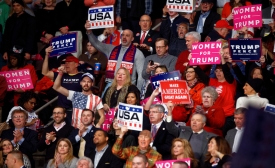Donald Trump
“A decent respect to the opinions of mankind,” intones the U.S. Declaration of Independence, requires that those who want to break away from a nation-state explain publicly their reasons for doing so. Today, however, following a dramatic week of events connected to the ascent of Donald Trump to the Presidency, a similar imperative requires that we try to explain to the world—and most of all to ourselves—what is going on.

Examining Trump's recent controversies to understand the Presidency in the coming months.
Ambassadors and guests from around the world gathered to kick off Donald J. Trump’s January 20 inauguration. Sister Cities International’s January 17 inaugural ball was among the first of many inaugural festivities in Washington as Trump becomes the 45th U.S. president.
![By Composed by User:Stannered [GFDL (http://www.gnu.org/copyleft/fdl.html) or CC-BY-SA-3.0 (http://creativecommons.org/licenses/by-sa/3.0/)], via Wikimedia Commons USA flag on television](https://uscpublicdiplomacy.org/sites/default/files/styles/275x168/public/uploads/1280px-USA_flag_on_television.svg__0.png?itok=03jgGwrM)
Emily T. Metzgar says the hype around recent changes to U.S. international broadcasting is "misleading and overblown."
Ireland must engage in a deeper way with its diaspora in order to prosper in a world of increasing uncertainty, Tim O’Connor, a former senior Irish diplomat, told a gathering of Irish-Americans in Dublin on Tuesday evening. Ahead of Donald Trump’s presidency in the US and the UK’s forthcoming departure from the EU, he said that now was not a moment to be thinking small.
As the new president-elect prepares to take office, traditional analysts scramble to prepare policy papers on their public diplomacy recommendations. In keeping with the twist of the Trump candidacy, it seems fitting to turn the tables and see what insights public diplomacy may glean from the Trump run. Social media, emotion, and identity are redefining traditional strategies, and Trump has exploited these shifting communication dynamics.
When dealing with the Trump administration, China should pay attention to several factors. First, China should get to know Trump's political ambitions, and establish contacts with his core team. China should strengthen the role of non-governmental actors in public diplomacy, and improve Sino-US public diplomacy by using think tanks to effectively control conflicts. Last but not the least, China needs to enhance social media communication and promote international discourse.
There are three possible Cuba scenarios in a Trump administration. The first is the uninterrupted continuation of Obama’s policy that has increased the scope of U.S.-Cuban commerce, allowed for expanded travel of U.S. citizens to the island, and normalized diplomatic relations. The second is rolling back all of the Obama changes, returning policy to the time of President George W. Bush, which would not only halt all U.S.







